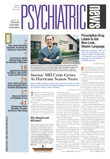According to John Fouts, the dual-recovery coordinator at the Mental Health Association (MHA) Village, at least 60 percent of Village members are impacted by drug and/or alcohol use. “We see the worst-case scenario of drug and alcohol use in this population,” he said.
While many mental health treatment centers make sobriety a condition of treatment and services, this is not the case at the Village, which employs“ harm reduction” strategies with members who abuse substances.
Harm reduction means “meeting the person where they are,” Fouts said, and emphasizes reducing harmful effects of risky behaviors. In other words, Village staff do not tell members that they must refrain from using drugs.
“When we ask someone to stop using,” Fouts said, “we're asking them to stop surviving—to stop fitting in or coping” in the world in which they live.
MHA Village Director Martha Long told Psychiatric News that“ our experience is that engaging people with acceptance is one of the only ways to even have a conversation at a later point.”
She also observed that “requiring sobriety drives away many people who in reality are capable of becoming sober or substantially reducing their use of harmful substances.”
Instead of asking members to abstain from drugs or alcohol, staff encourages them to talk about their values and goals, “and then we talk with members about how their choices, actions, and behaviors may clash with what they value” or how substance use may prevent them from achieving their goals.
Nonetheless, people may be able to achieve some short-term goals without being sober, Fouts noted.
In an exchange with an alcohol-addicted member who wanted to work, Fouts said that he helped the member find a job that would fit in with his lifestyle. “I know you drink a lot, and I know you drink late,” he said to the member. “So let's start with a part-time job in the afternoon.”
So that Village members are not denied housing on the basis of their addiction to drugs or alcohol, staff tailors housing to those with substance use problems.
People with addictions to crack or speed, for instance, would not be placed in quiet buildings with a building manager on site, but perhaps in a building with back-alley access, according to Housing Coordinator Diane Figgins.“ Am I allowing them to continue their crack use? That's their choice,” Figgins said. “My job is to find them stable housing, and this is the best way to do that given that they have decided to use.”
While some people might see the provision of housing to people with addictions as “enabling” bad behavior, noted Long, “we see it as engagement with the ultimate goal of helping people learn how to better control behaviors” that might be endangering them.
Those who do choose to use drugs while working or living independently may require help from money managers working at the Village to help them budget their money so that they have enough money for rent and food.
In addition, some members request the Village to serve as payee for them.“ Sometimes, members are exhausted by the consequences of their addiction and ask us to be their payee” so that they can better manage other aspects of their lives, Long noted. ▪
